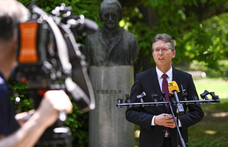"There is no problem with relations wherever politics isn't involved," - said Etelka Riba, vice-president of the National Slovak Minority Council in connection with the rising tide of anti-Hungarian sentiment in Slovakia. But it would seem politics has spread far and wide since Jan Slota, president of the Slovak National Party, a member of the governing coalition, made repeated anti-Hungarian statements, saying he would prefer to see the Hungarians of Slovakia living on the far side of the Danube.
This had its effect. First, a video of a Hungarian flag being burned appeared on the internet. Last week, in the Slovakian towns of Nyitra and Dioszeg, ethnic Hungarians were attacked. In the first case, a female university student was beaten - she claims because she was speaking Hungarian on the telephone - and a reference to retreating beyond the Danube was written on her back. The perpetrators are still being sought - Slovak authorities have supposedly established a special unit to find them. Admittedly, they are being sought for robbery, since the two young men stole the girl's mobile phone. Later the same day, a boy was attacked by people who mentioned Slota. The perpetrators in this case were caught - though they deny any ethnic motivation.
The political scientist Laszlo Ollos told HVG: "There have always been aggressive anti-Hungarian groups, but they were not widely heard while the Hungarian Coalition Party (MKP) was in government." He believes the conflict may escalate further. He said there were two milestones along the path to the present situation. The first was when the Slovak government began to tolerate anti-Hungarian sentiment. Robert Fico, the prime minister, did not distance himself from Slota's comment when his government was formed. The second milestone came when the effect of this rhetoric on society led to first verbal, then physical attacks. Several Slovak papers made similar observations at the beginning of last week, blaming Fico's silence and ambiguity for the growing seriousness of the situation.
It is not clear how far the Slovak government can distance itself from extremist comments without renouncing Jan Slota, all the while presenting Slovakia as a European state without ethnic tensions. On Tuesday, on Hungarian Television's evening news programme, Jan Kubis, the Slovak foreign minister, cautiously distanced himself from extremist comments made by the government's supporters, without mentioning any names. He said the Slovak government would continue to condemn all extremists "in general". He also proposed that Hungary and Slovakia should issue a joint statement against racism. He also made a point of visibly condemning two football fans holding a placard with the words "Death to Hungarians". Police in Hungary had not at that point found it necessary to move against fans holding - less violent - anti-Slovak banners. On Tuesday, however, at a match in Mosonmagyarovar, the police charged fans holding anti-Slovak banners with disturbing the peace.
On the other hand, Slovakia does not regard the attacks on ethnic Hungarians as racially motivated. The government has even lashed back, accusing the Hungarian Coalition Party of trying to make a mountain out of a molehill for political reasons.
It would seem the diplomatic tools at the Hungarian government's disposal have been exhausted. Any further statements are more an exercise in domestic political communication than a serious attempt to force the Bratislava cabinet to take a stand. Ferenc Gyurcsany seemed to be thinking along these lines when he made a strongly-worded comment about the issuing of an oral communication to the Slovak government. This is a traditional form of inter-governmental communication. Before handing over a written statement, a foreign policy head states what he has to say aloud, so that a representative of the other country can pass the message on to his own foreign ministry. With his comments at the weekend, Gyurcsany was able at least to line up the parliamentary opposition behind him. The only remaining diplomatic gambits are to arrange bilateral meetings and file a formal complaint with the European Union. This has not yet been suggested - at least by members of the Hungarian government. But Pal Csaky, the vice-president of the MKP, said on Monday that his party would table a motion in the Slovak parliament condemning racism.
Further, if the situation and the Slovak government's attitude did not change within two weeks, he would explore "European forums". But this threat has done little to promote an atmosphere of calm. Partly because growing numbers of organisations want to have their say in the matter. At the end of the week, an anti-racism rally is expected in Bratislava. Equally, the far-right Hungarian group 64 Counties Youth Movement is holding rallies in Budapest and Bratislava.
This group claims to have identified the unknown perpetrators behind the attack on the young girl in Nyitra and to have passed the information on to the Slovak authorities.
There are countless signs of nationalism and the fear of nationalism in daily life. A few days ago in Kosice, a shopper asking in Slovak for an English-language paper was questioned by the newsagent, who wanted to know why the shopper did not buy a Slovak-language paper in Slovakia. In Hungary, on the other hand, rumours are spreading of Slovaks attacking Hungarians in the ethnically Hungarian regions of Slovakia that were once known as Upper Hungary. On Tuesday, for example, it was claimed that a man in Revkomarom who asked for a light in Hungarian was beaten, though this had not been confirmed at close of press.
ÁKOS TÖMÖRY

















